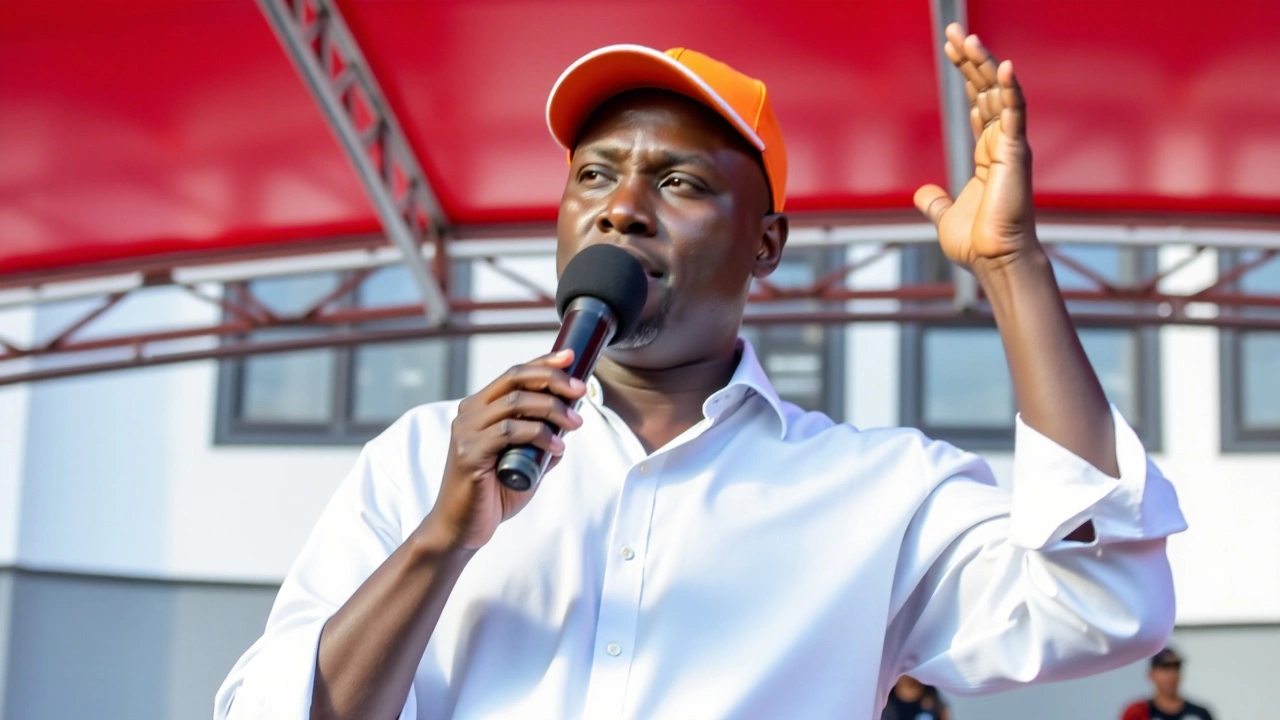Junet Mohamed Dismisses Rumors of Cabinet Appointment
In the ever-dynamic theater of Kenyan politics, speculation and innuendo often swirl with speed and intensity. Recently, Junet Mohamed, the National Assembly Minority Leader, found himself at the center of a political maelstrom, fueled by rumors of his supposed ascendancy to the role of Interior Cabinet Secretary. These suggestions originated amidst talk that the Orange Democratic Movement (ODM) could secure an additional ministerial portfolio in President William Ruto's progressively inclusive administration.
Addressing the conjecture directly, Mohamed issued a resounding denial, emphasizing his current satisfaction with duties as a parliamentary leader. Confident in his mission within parliament, Mohamed was unambiguous in his response, stressing his lack of participation in any cabinet role bid, saying, "I have become aware of unfounded speculation regarding an interest in the Cabinet Secretary position for Internal Security and National Administration. Public service is always an honor, but this is not a post I am pursuing, nor has the ODM put forward my name for this prestigious role."
Mohamed stands as a prominent and close ally of former Prime Minister Raila Odinga and has reiterated his commitment to serving within the confines of parliament. He viewed his responsibilities as significant, underlining the vital constitutional framework of Kenya's governance structure. Regardless of the swirling rumors, Mohamed made it clear that his role remains unchanged, determined to contribute to shaping policy and lawmaking.
Transformation in President Ruto's Cabinet
Such speculation links closely to anticipated changes within President Ruto's government. The landscape is set for a shift as ongoing legal proceedings contest the removal of former Deputy President Rigathi Gachagua. If these efforts conclude with changes at the helm, Kindiki is poised to step into the Deputy Presidency. Such moves would leave the Interior Ministry portfolio vacant, possibly shaping future political maneuvers.
An intersection of changes spans to the Ministry of Gender role, still vacant after the rejection of Stella Soi's nomination in parliament. The decisions reflect keen legislative scrutiny, emphasizing the understanding and capability of candidates to fulfill high-demand portfolios. While President Ruto enjoys considerable parliamentary support, as evidenced by the vote favoring Kithure Kindiki's nomination as Deputy President, murmurs about cabinet configurations continue unchecked.
Contrary Claims of Lobbying
Amidst these denials, some opposition voices suggest alternative narratives. Notably, possibly sparking additional interest was Nyaribari Masaba MP Daniel Manduku’s bold claims on a K24 televised segment. Manduku posited that Junet Mohamed had, indeed, been proposed by ODM as a successor, ready to step into the critical Interior role post-Kindiki's anticipated elevation. Bringing further intrigue, Manduku suggested, somewhat cryptically, that Kindiki may have already discreetly tendered his resignation, compounding the tension around leadership roles.
Against this backdrop of political machination, the presence of Raila Odinga, who commands a significant following and negotiation weight, underlined a strategic push for a broader representation within the cabinet. His demand for the allocation of fifteen Cabinet Secretary roles exemplifies ongoing negotiations, heralding possible shifts in power dynamics enriched by historical context and the struggle for a balanced governance approach within Kenya’s expansive political mosaic.
Potential Implications and Future Outlook
The negation by Junet Mohamed comes at a time when regional and national stakeholders eagerly await concrete changes from President Ruto's administration, which pledges inclusivity and service delivery enhancements. Political observers keenly watch how Kenya's leadership recalibrates amidst internal shuffling, legislative recalibrations, and heightened public expectations enrich an increasingly complex political tableau.
In layers, the unfolding circumstances offer a window into cabinet politics' complexities, reflective governance pursuits, and diverse party dynamics. As Junet Mohamed remains steadfast to his current role, the broader political scene anticipates further intricacies ahead, paving paths for political contenders and constituents alike while engaging deeply within the national dialogue on democratic representation and power-sharing.


musa dogan
October 29, 2024 AT 13:15And don’t get me started on Ruto’s cabinet shuffle-this isn’t governance, it’s a soap opera with better suits.
Drasti Patel
October 29, 2024 AT 16:33Mark Dodak
October 30, 2024 AT 15:36Also, Raila pushing for 15 seats? That’s not just negotiation-that’s legacy-building. He’s playing the long game.
Stephanie Reed
November 1, 2024 AT 03:23Jason Lo
November 2, 2024 AT 04:06Brian Gallagher
November 3, 2024 AT 23:17One must distinguish between performative rhetoric and constitutional praxis.
Elizabeth Alfonso Prieto
November 5, 2024 AT 06:04Also, I think Junet looks tired in that photo. He needs a vacation.
Harry Adams
November 6, 2024 AT 04:34And Manduku? A walking leak. The real story here isn’t Junet-it’s the fact that someone’s leaking resignation rumors before they’ve even been filed. That’s the kind of chaos that turns governance into a reality TV show. Boring, but addictive.
Kieran Scott
November 6, 2024 AT 23:23And let’s be honest-Junet’s ‘satisfaction’ with parliament? That’s what you say when you know you’re not getting the real power. He’s playing the long con. Everyone here is. And we’re all just spectators to a rigged game.